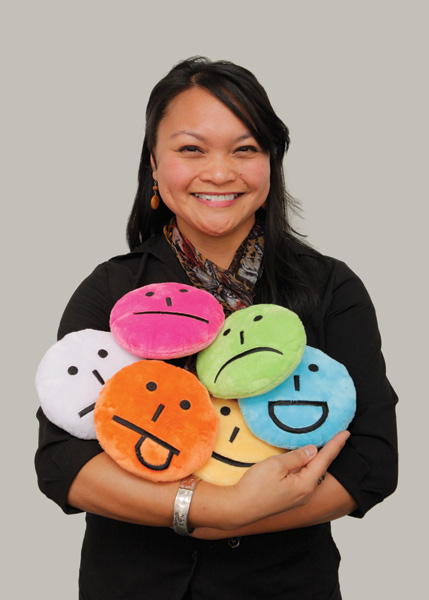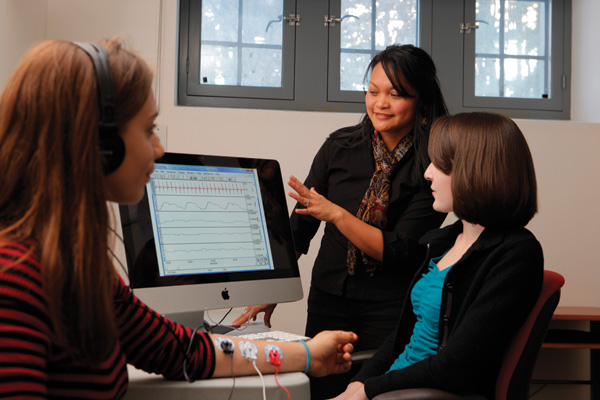Putting Resilience to the Test
Happiness. Over the centuries, philosophers, theologians, political theorists, sociologists, humanists, and psychologists have attempted to define it and offer prescriptions for how to achieve it. But the scientific study of happiness is a new field known as positive psychology.

The field of study officially began in 1998 when Martin Seligman, the Zellerbach Family Professor of Psychology at the University of Pennsylvania, declared it a focus of his term as president of the American Psychological Association.
Michele Tugade ’95, then a doctoral student in social psychology at the University of Michigan, got in on the ground floor of this emerging field. “The focus of most of the research and theory in the 20th century was on psychological ailments and disorders,” says Tugade, “and those areas of psychology are obviously still hugely important. But positive psychology seeks to understand well-being. What are the conditions and characteristics that enable us to thrive and to be resilient?”
Not to be confused with “positive thinking” of the Norman Vincent Peale variety, positive psychology is not a self-help technique, but a rigorous scientific discipline. Much of Tugade’s work and the work of other positive psychology researchers over the past decade is presented in the forthcoming Handbook of Positive Emotions, coedited by Tugade (with M. L. Shiota and L.D. Kirby) with a foreward by Barbara Fredrickson, one of the pioneers of positive psychology.
Tugade began working with Fredrickson when she was a doctoral student, and the two have collaborated on numerous studies since. Their initial work together had to do with the critical contribution of positive emotions to survival of the human species. Much of the early research at the time focused on the evolutionary benefits of negative emotions, but they wanted to investigate the evolutionary role positive emotions play.
“A negative emotion such as fear arouses a physiological fight-or-flight response, which confers some evolutionary advantages in terms of survival,” says Tugade. “But positive emotions have the opposite physiological effect. They ‘undo’ physiological arousal.” That “undoing” effect, Tugade and Fredrickson, et al. theorize, confers the evolutionary advantage of flexibility. “If you are in a heightened state of cardiovascular arousal, you are geared to either fight or flee,” says Tugade. “Other behaviors aren’t really an option until you calm down. Our experiments showed that inducing a positive emotion enabled our subjects to return to baseline more quickly.”
After a postdoc at the Interdisciplinary Affective Sciences Laboratory at Boston College, Tugade joined the faculty at Vassar, where she teaches courses in social psychology, individual differences, and health psychology and directs the Emotions and Psychophysiology Laboratory. Her research focuses on the role of positive emotions in coping with stress and the mechanisms that promote resilience in the face of stress and adversity.
Tugade pioneered a new experimental methodology, using hand-held computers available at that time—PDAs (personal digital assistants). The participants were divided into experimental and control groups. Both groups received five prompts during the day to answer a series of questions about their emotional state and their activities. The control group was given neutral activity prompts, such as, “Since you were last prompted, did you walk to class?” while the experimental group was given positive activity prompts, such as, “Since you were last prompted, did you appreciate your surroundings?”

After two weeks, the participants showed significant differences, not only in self-reported levels of emotional well-being but also in cognitive flexibility. According to Maggie O’Haire ’08 (Tugade’s research assistant on that study, now a PhD candidate at the University of Queensland), the experimental group went from predominantly analytic thinking to more dialectical thinking. “Basically, analytic thinking is where, if you have two opposing viewpoints, you need to pick one to feel comfortable,” O’Haire said in a 2008 interview. “Dialectical thinking is where you can appreciate contrast and complexity and be more comfortable with it, and find a middle way. So just by focusing on the positive daily activities, the participants were broadening their cognitive abilities.”
Since then, Tugade has continued the project, but now using text-messaging to cell phones instead of PDAs. Scores of students have taken part in this ongoing experiment, receiving as many as five daily text messages encouraging them to use positive strategies to cope with stress, such as taking a moment to consider something they’re thankful for. Repeated exposure to these messages, even in the limited two-week time frame, yields encouraging results. “We bring those students back into the laboratory, and they report feeling more socially connected to others, and they also report fewer physical health issues,” says Tugade, who notes that social support has been shown to be a marker of resilience. “Doing this through mobile technology is one way to train individuals to recognize and appreciate positive emotions in their lives.”
While the literature suggests that resiliency is at least partly hereditary, these experiments suggest that it is a skill that can be learned. “Practice is really the key, and we’re trying to find out: How much practice?” says Alta du Pont, a postbaccalaureate research associate and lab manager who works with Tugade on the research.
Du Pont, who earned a psychology degree from Princeton University, hopes ultimately to enter clinical practice. She says she finds the texting intervention exciting because it translates into concrete outcomes. “We found, for example, that participants who use the positive strategies reported fewer health symptoms—fewer headaches, less dizziness, things like that,” she says. Subjects also reported better sleep quality.
The text-message experiment is just one way Tugade is putting emotional resiliency to the test. In another study, she induces emotional reactions by exposing lab participants to music that evokes positive emotions (Vivaldi’s Spring concerto) or negative emotions (Barber’s Adagio for Strings). Sensors monitor the subject’s heart rate, respiration, and blood pressure and measure how those physiological responses vary depending on the circumstances. In another experiment, she uses film clips to the same end.
In still another, participants are asked to prepare a public speech. “Public speaking is something that always and reliably elicits a stress response,” Tugade says. “You see an immediate rise in heart rate and blood pressure and respiration. This stress response is important but can be damaging to the body if sustained for a long period of time. The goal of these studies is to examine what people can do psychologically to down-regulate the stress response.”
Some participants are more naturally adept at conjuring up positive emotions even under stress, whereas others are not, says Tugade. “What our lab is trying to do is identify the markers. What are these people doing that helps them achieve resilience? What we find is that when you experience positive emotions—like gratitude, contentment, or serenity—in the midst of a stressful experience, you are more resilient, and we can measure that physiologically.” In addition to the physiological markers of resilience, Tugade, du Pont, and undergraduate research assistants are looking at cognitive markers, such as mindfulness. “Work in our lab and others shows that people who are more aware of their emotions are more skillful at using their emotions to achieve particular goals,” says Tugade.
This isn’t to say that we should all aim for a Pollyanna outlook at all times, Tugade cautions. “You can imagine a particular context in which it might not make sense to try to put a smile on your face,” she says. “Trying too hard to be positive can actually be undermining. Balance is the key.”
Tugade is one who practices what she preaches and the results have been (pun intended) positive. “There’s a lot that I’ve learned from my research,” she says. “Several times a day I think of something that I’m grateful for. That’s one of the benefits of doing work like this.”
